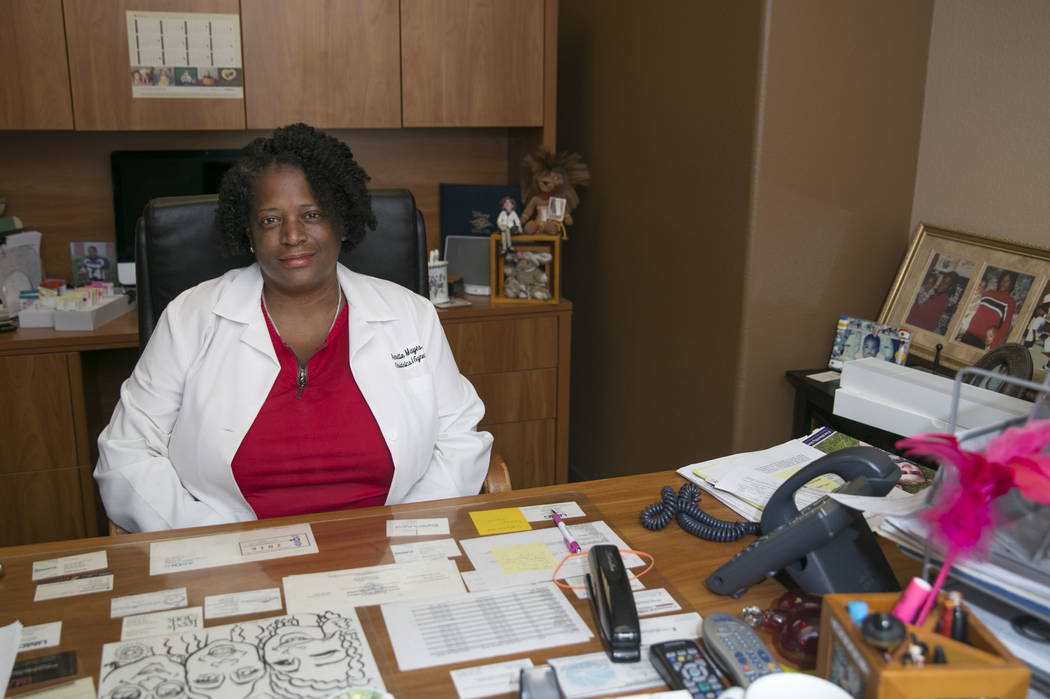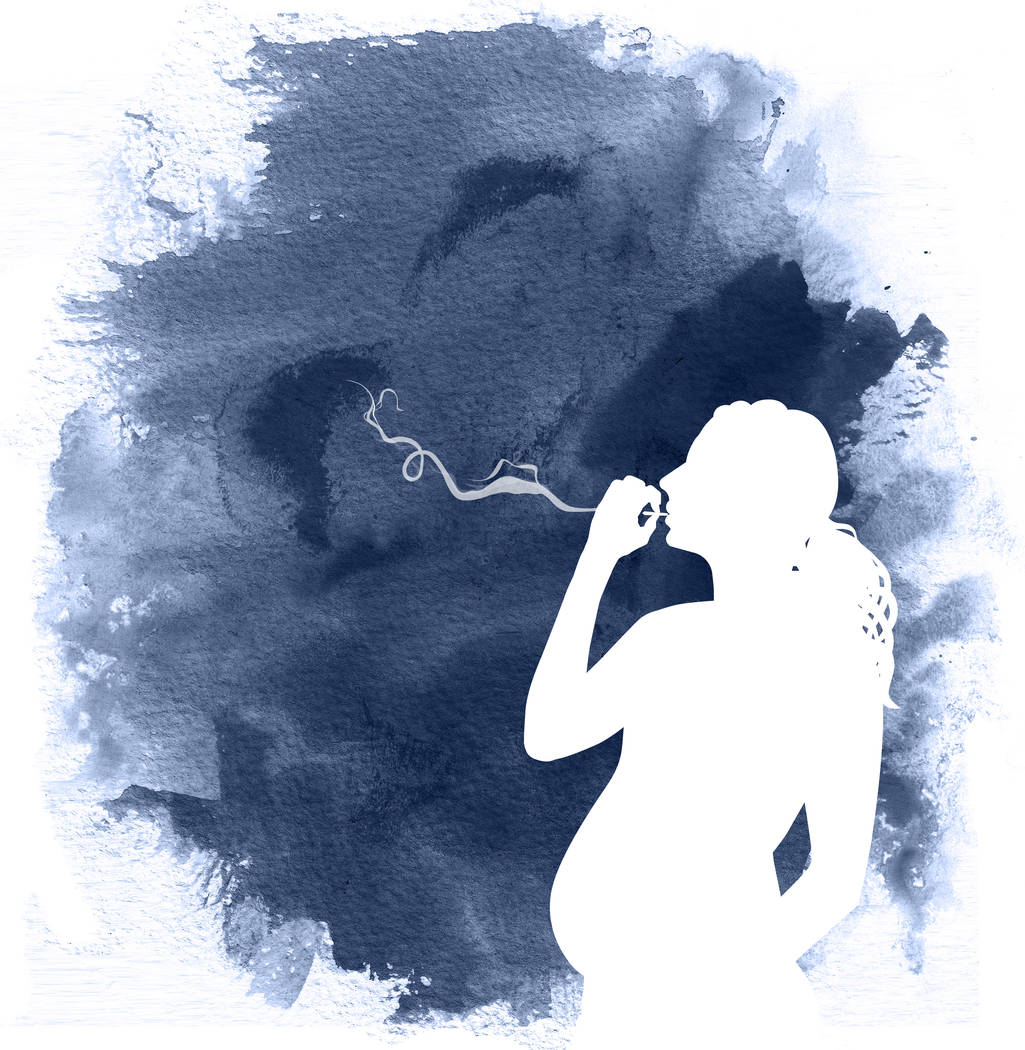Increased use of pot by pregnant women spurs Nevada campaign
The state of Nevada is preparing a public information campaign to address the increasing use of marijuana by pregnant women and highlight the potential harm the drug can do to a fetus.
The public service TV and radio ads, which will begin airing in December, come as research shows that more pregnant women are using pot. A federal study last year found that marijuana use by pregnant women in the U.S. increased from 2.4 percent in 2002 to 3.9 percent in 2014, a 62 percent jump.
Studies in states that have legalized recreational pot suggest the rate of use is far higher.
In Colorado, where marijuana was legalized in 2014, one Pueblo hospital reported that the number of babies born with the chemical effects of marijuana in their systems doubled in two years. Dr. Larry Wolk, executive director and chief medical officer of the Colorado Department of Public Health and Environment, called the report anecdotal but noted that the state’s most recent official survey found that 6 percent of pregnant women were using marijuana.
In 2015, before Nevada fully legalized marijuana for adult use, self-reported data from women — generally low because respondents don’t like to admit to substance abuse — indicated that 5.5 percent used the drug during pregnancy.
Dr. John DiMuro, Nevada’s chief health officer, said more recent reports from hospitals suggest that even more expectant mothers are using marijuana.
One mother’s story
DiMuro is concerned that legalization of pot in Nevada will help fuel the perception that because marijuana is a plant it is safe to use during pregnancy, especially for nausea.
That was the reason given by a 26-year-old Las Vegas woman who says she has frequently smoked marijuana during her pregnancy. The woman, who spoke with the Review-Journal on condition of anonymity, acknowledged she is worried the drug could hurt her child.
“I didn’t use it with my first two kids. I was afraid,” she said. “But this time my nausea was so bad I did. What the doctors gave me for nausea didn’t work. Even after the nausea went away, I kept using it — never in front of my kids. I’m not sure why. Maybe because we legalized it. I’m worried, but not too worried. Tests show my baby is fine so far.”
Though some mothers-to-be used weed as it soared in popularity in the second half of the 20th century, until recently the pot-pregnancy combination was not considered a significant issue and was seldom discussed by public health officials.
No longer. With eight states, including Nevada, permitting adults to use recreational marijuana and an additional 30 allowing medical use, health experts now regularly warn about marijuana’s possible negative effects on the unborn, especially in potential developmental delay.
Despite the increasing concern, there is no definitive research about pot’s effects on the fetus. DiMuro offers a succinct reason why: “Research is not consistent.”
But there is enough science on the subject to make pregnant women cautious, Las Vegas obstetrician Dr. Annette Mayes said.
“We don’t know for sure what marijuana use does to the fetus,” she said. “But we know enough to say it’s not a good idea to use it.”
Campaign’s focus unknown
DiMuro declined to specify the focus of the state’s ad campaign. But he noted that the strongest consensus surrounds developmental delay observed in elementary school-aged children.
He also said public health staffers have reached out to their counterparts in Colorado, where public health campaigns warning that pot use “may make it hard for your child to pay attention and learn, especially as your child grows older” have been visible for three years.
In addition to the development concern, DiMuro said more study is needed to reach consensus on marijuana’s effects, if any, on preterm birth, low birth weight, smaller head circumference and other conditions.
Nevada tests few new mothers
In a phone interview, DiMuro and two other public health officials, Julia Peek and Stephanie Woodard, said birth mothers in Nevada are not tested for marijuana unless they’ve self-reported use or are obviously intoxicated, or authorities, often from Child Protective Services, have reason to suspect the use of drugs during the pregnancy.
Some states, including Alabama, often test pregnant women for marijuana, sometimes without their consent, and charge them with felony chemical endangerment of a child if they are found to have used it. Nevada, however, tries not to criminalize women’s drug use and instead aims to get them into treatment, Peek and Woodard said.
Even so, Child Protective Services may investigate and find that the woman’s use of marijuana is a risk factor showing evidence of child abuse or neglect in the home. That could result in the newborn being placed in foster care, they said.
Fear of CPS is the reason the pregnant woman who’s used marijuana during her pregnancy didn’t want her name used in this article.
“I don’t want CPS opening some case against me and have my kids taken away,” she said. “I’m a good mother who’s praying my use of marijuana won’t hurt my child.”
Contact Paul Harasim at pharasim@reviewjournal.com or 702-387-5273. Follow @paulharasim on Twitter.
Few studies have examined pot and pregnancy
Research on the effects of marijuana use during pregnancy is scant. While it is well-documented that the developing brains of teens can be altered through regular use of marijuana, far fewer studies have been done on the long-term impact of exposure in the womb.
Research done in Pittsburgh and published in 2000 in the peer-reviewed Neurtoxicology and Teratology journal found that 6-year-olds born to a mother who had smoked one joint or more daily in the first trimester displayed less ability to comprehend concepts in reading and listening — and by age 10 they had lower reading, math and spelling scores than their peers.
It also found that children exposed to marijuana's major psychoactive element — tetrahydrocannabinol, or THC — in the womb were more impulsive and less able to focus their attention than other 10-year-olds.
Several other studies also have found changes in the brains of fetuses 18 to 22 weeks old linked to maternal marijuana use.
A study published in the peer-reviewed American Journal of Pediatrics in 1994 found that Jamaican women who heavily smoked cannabis during their entire pregnancies had babies that early on outperformed those born to non-using mothers.
The research by Melanie Dreher, now dean of nursing at Rush Medical Center in Chicago, studied the two groups of women and then examined their babies about a year after birth. Researchers found the babies of the marijuana users socialized more quickly, were easier to engage and made eye contact more quickly.
Dreher's study made little impression on the American College of Obstetrics and Gynecologists and the American Academy of Pediatrics. Both advise against marijuana use during pregnancy because of the studies linking it to cognitive impairment and academic underachievement. Both organizations also recommend that mothers with THC in their systems do not breastfeed.
Many researchers say the federal government's classification of marijuana as a Schedule 1 controlled substance — the same category as heroin — has had a stifling effect on scientific study. Research-grade marijuana for federal-approved studies used to be produced by a single lab at the University of Mississippi and often took years to acquire. The U.S. government recently revised regulations to allow researchers to buy marijuana from other sources.
— Paul Harasim























